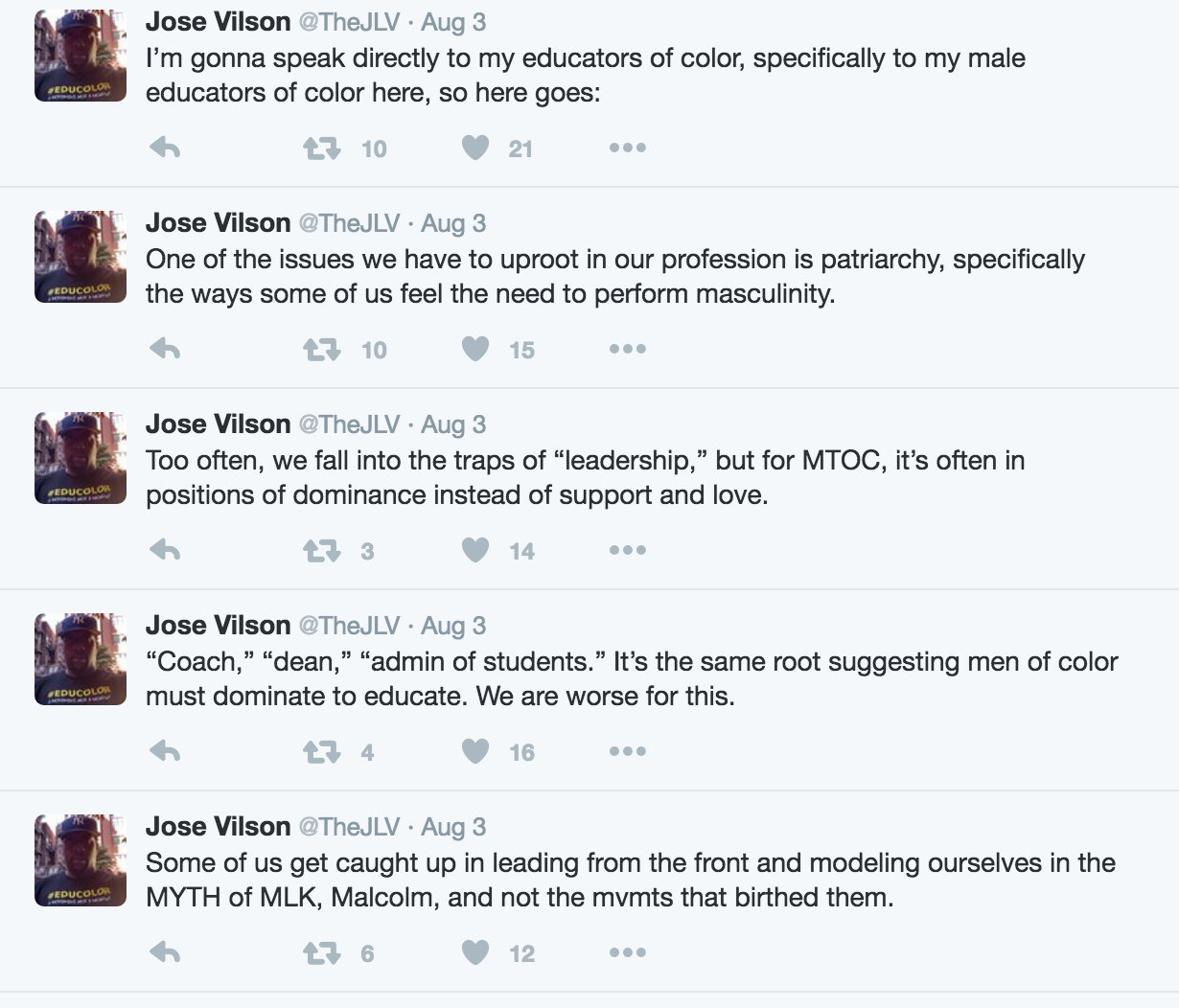Wednesday night, I had the opportunity to participate in a Twitter chat on #BlackMaleEducators. The questions were poignant and spoke to current and aspiring teachers as well as potential allies in leadership positions in schools, districts, or policy. The chat began with 140 character libations to honor Black male educators who inspired us to join the profession.
A theme that particularly seemed to resonate was the stark need for diversity in our children’s teachers.
Several participants in the chat lamented the diversity and spoke candidly about the need for more diversity.
But, an even more pressing need for diversity in the teaching sector, one of life and death, emerged as well.
As David Johns frequently states and mentioned in the Twitter chat:
I will go to my grave believing that I'd #MichaelDunn had #BlackMaleEducators he would not have killed #JordanDavis. Period.
— David Johns (@MrDavidJohns) August 3, 2016
When I hear of some of the stories relayed to me from parents and other educators about how some educators allegedly talk about or treat Black kids it makes me cringe. I shudder further when I think that same mindset is behind many badges and guns.
The pen is indeed mightier than the sword. Policies can be even more lethal than the 6000+ individual guns on Philadelphia police officer holsters. The unaware may raise an eyebrow at that statement, but when you look at the pervasive damage that racist policies inflict on communities, you know that the racist educator (or police officer) is wielding a dangerous mindset that can continue to inflict insidious damage on our students of color—often reinforced and validated through those same policies.
The diversity of our educator and teacher pools will not only serve all children well but it can also serve other educators. Having diverse colleagues can spark formal and informal professional development for us all. If we are thoughtful enough, it can lead to meaningful conversations and policy shifts within our schools and thus society.
A Second Look
After the chat was over, I went back to read the hashtag and noticed that Jose Vilson had posted several tweets addressed to male teachers of color. While he chose not to answer any of the questions that girded the chat, he brought up several points that are worth noting.
I’m not going to post the entire thread but it started like this:

and then ended like this:
I’m not done, but I am finished. pic.twitter.com/wrcBiATrsX
— José Vilson, NBCT (@TheJLV) August 4, 2016
You can find the entire thread here.
Jose’s biting comments about Black male educators, their collective potential, habits, and motivation appeared to be off base.
The comments had mainly been very supportive, giving districts and school leaders ideas about the importance of recruitment and retention while providing a platform for Black Male Educators. The questions were basic and crafted to elicit positive responses and an opportunity to problem solve and share ideas that could move us forward and generate momentum.
Let's not lose sight of the brothers closest to us. Our colleagues, teachers, our friends. Show them love and support #BlackMaleEducators
— Jabali Sawicki (@JabaliSawicki) August 4, 2016
It's hard to attract #BlackMaleEducators if they have been told they don't fit in schools as students.
— Robert Croston (@1robcee) August 3, 2016
#BlackMaleEducators we can support one another by networking from this #follow #followback + connect on #LinkedIn @edu_post @AfAmEducation
— Shavon (@WhenUSeeMeSeeU) August 4, 2016
https://twitter.com/Development_Guy/status/760995274869338112
So, it felt like a little bit of a hijack when Jose Vilson, decided the best way to contribute to the medium was to list all of the ways he feels Black males and other male educators of color are lacking in his view. Not a single response to the posed questions. Not a single word of encouragement to the many men and women that participated in the chat—several of whom reached out to me and other organizations to seek additional support, encouragement, and resources.
Jose’s comments are certainly not without merit, but it reminds of us how and when to offer support and when to offer admonishment. A coach should be humble and careful to not use the wrong tools to coach and inspire.
A better move would have been to think of the Black man trying to enter into the profession to give them pointers about networks that could support Black male educators. Schools and districts struggling with retention could have been offered suggestions.
Unfortunately, Jose gave no advice for schools seeking to support and retain Black male educators who are leaving the profession at alarming rates. I read Jose’s Tweets hoping that eventually I would get to where he offered support and maybe even his own organization’s resources as a lifeline for those who need it now or in the future.
I am not saying that Jose’s admonitions aren’t warranted in their proper place and time. However, he either chose not to read the questions or he chose to disregard them. He frequently speaks of community and would not take kindly to someone listing all the negative generalizations people make about educators of color on his platforms.
When people outside of schools make these types of decisions, I shake my head. When the advocates and promoters of education chose to do so, it raises my eyebrows.

